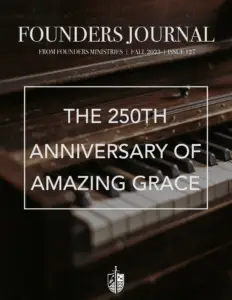There are not many events from the year 1773 that still affect our lives today. There are not many people who were around in 1773 that are still remembered today. But I can guarantee you that on any given Sunday, Christians in various churches around the world are singing a song written by an ordinary pastor in 1773. “Amazing Grace” has been advertised as a song written by a former slave trader and as a song written by an abolitionist (both of which are true), but it should not be lost on us that John Newton wrote this hymn as a pastor. And in this 250-year-old hymn, Newton continues to pastor God’s people today with truths to anchor our faith and lessons to guide our ministries.
Here are a few reflections on the way “Amazing Grace” might shape our own walk with Christ and service to Him.
Written with Humility
The name of this hymn is more well-known than its author, and that’s exactly how Newton would want it to be. When he sat in his study on a cold winter day in the small town of Olney to write this hymn, he never dreamed it would go on to become the most famous hymns in history. He wasn’t thinking about the world; he was thinking about Olney. Newton never dreamed this song would one day be sung by world leaders; he was thinking about his own congregation. Newton wrote ‘Amazing Grace’ with the goal to honor Christ and edify His people. He didn’t write for fame but to serve.
Every pastor (and every Christian) must always be on guard against the tendency to do things for our own glory. We may not have global or even national aspirations, but we all desire recognition or credit from someone for the work we do. We all, like the disciples, have spent our energy arguing (even inwardly) over which of us is the greatest (Luke 22:24). Newton knew this battle in his own heart as he once wrote, “Self likes to do great things, but grace teaches us to do little things with a great spirit – that is for the Lord’s sake.” We should pray that the same amazing grace that saves sinners like us would also grow a humble heart in each of us that cries out with John the Baptist, “He must increase, but I must decrease.” (John 3:30)
Written with Faith
The shape of “Amazing Grace” flowed out of a long-established habit of Newton’s. At the beginning of every new year, he would dedicate time to both look back over the past year reflecting on what the Lord had done and look forward to the next year dreaming about what the Lord may do. In Newton’s words, he was looking to “past mercy and future hope”. In fact, Newton’s original title for “Amazing Grace” was “Faith’s Review and Expectation”. Newton knew the importance of anchoring our present experience in God’s past faithfulness and future promises, and he lived, pastored, and wrote with the wide view of God’s work in mind.
The words of “Amazing Grace” carry you across the entire path of the Christian life. One author describes this hymn as “a collective autobiography for every Christian. ‘Amazing Grace’ is perceptive biblical theology, embraced by one man deeply moved by his own redemption, articulated for corporate worship.”[1] If you want to know where your life and ministry have been, currently are, and are going, allow Mr. Newton to tell you the story of God’s grand redemptive work. He is the God of our past, present, and future. He is the Ancient of Days. He is the same yesterday, today, and forever.
Newton’s faith-filled reflection should prompt our own: Is our view of the past characterized more by nostalgia and regret or God’s mercy and faithfulness? Is our view of the present shaped more by our mood and circumstances or by God’s presence and truth? Are our hopes for the future built on the world’s temporary joys or God’s eternal promises?
John Newton knew that faithfulness to Christ over a lifetime could only grow out of a wide view of God’s work. Living with this wide view adjusts our outlook on what a life of faith looks like for ourselves and for those we serve. As Newton once wrote, “Remember, the growth of a believer is not like a mushroom, but like an oak, which increases slowly indeed but surely. Many suns, showers, and frosts, pass upon it before it comes to perfection; and in winter, when it seems dead, it is gathering strength at the root. Be humble, watchful, and diligent in the means, and endeavor to look through all and fix your eye upon Jesus, and all shall be well.”
Written with Truth
“Amazing Grace” was one of many hymns written by Newton over the course of his ministry. In their famous Olney Hymns, John Newton and William Cowper compiled almost 350 hymns, and 280 of them were written by Newton.
His goal was never hymn writing for the sake of hymn writing. He originally began the practice of writing hymns to accompany his sermons with the goal of making God’s Word more accessible for his people. The small village of Olney was made up of mostly poor and uneducated laborers, and Newton’s hymns put theological truths in a form that was both accessible and memorable for his people. “Amazing Grace”, like many of Newton’s hymns, is written with great simplicity. Most of the words in the song are only 1 syllable! Newton demonstrated great love and care for his congregation.
The specific truths that he wanted to communicate to the people of Olney through “Amazing Grace” flowed out of 1 Chronicles 17. King David’s prayer in these verses sparked Newton’s own “review and expectation”, and he wanted to guide the faith of his church in the same direction. This connection to Scripture is one of the most important lessons of this famous hymn. The lyrics of “Amazing Grace” are not a compilation of Newton’s own thoughts and opinions; they are expressions deeply rooted in biblical truth. His own active relationship with the Lord through the Bible was the source of his ministry to his people. For Newton, ministry was not utilitarian, it was devotional. God’s Word was not simply a tool used for pastoring people, it was a treasure that led to abiding in Christ. As we learn to enjoy Jesus in our daily lives and serve Him in ministry, may we say with the psalmist, “I rejoice at your word like one who finds great spoil.” (Psalm 119:162)
Written with Sincerity
Though “Amazing Grace” is one of the most famous songs of all time, the circumstances of the day Newton first introduced the song have remained in the background. The story of January 1, 1773 demonstrates the honesty of Newton’s experience of God’s grace and the sincerity of his commitment to express that grace to others.
In Newton’s journal entry from that day, after preaching from 1 Chronicles 17 and singing “Amazing Grace” for the first time ever, he wrote the following entry in his journal, “I preached this forenoon from 1 Chronicles 17:16-17. Hope I was enabled to speak with some liberty, but found my own heart sadly unaffected.” Newton’s honesty here should be a great encouragement to every Christian that senses dullness within your heart. On the day that John Newton introduced what would become the world’s most renowned hymn, his heart was “sadly unaffected”. To some this may raise a red flag, but it should do the exact opposite. Newton’s freedom to acknowledge his flat heart only serves to further spotlight the beauty of God’s grace. It is not a sign that his lyrics were insincere but proves their sincerity. How amazing that God graciously chose to save sinners knowing our hearts will be slow to respond even after experiencing such a great salvation.
On top of the condition of Newton’s soul on that cold day in 1773 is the state of his friendship with William Cowper. The renowned English poet was one of John Newton’s closest friends. Cowper was in the service at St. Peter and St. Paul that morning. He heard Newton preach from 1 Chronicles 17, and he sang “Faith’s Review and Expectation” with the congregation. But, unfortunately, this was the last time Cowper would attend a worship service for the rest of his life. Cowper experienced seasons of deep depression, and as he walked home from church that day he felt himself slipping into another bout of depression. His mind drew darker as he struggled home. Once home, he wanted to express his faith in the midst of his emotion and doubt, so he sat down and wrote another now famous hymn, “God Moves In A Mysterious Way”. As Cowper continued to sink into a downward spiral, Newton was called to Cowper’s house that evening. Cowper had attempted suicide, and Newton arrived, cleaned him up, and continued to show his love and care for his friend by visiting him many times in the weeks and months to come. It is not far fetched to think that Newton had Cowper in mind as he wrote and sang “Amazing Grace”.
John Newton was no stranger to suffering throughout his life. From Newton’s perspective, the most significant trial he ever endured was the death of his dear wife, Polly. On the 1-year anniversary of her death, Newton wrote in his journal, “At length, the trial which I most dread came upon me…My right hand was not chopped off at a stroke…It was sawn off by slow degrees; it was an operation of weeks and months; almost every following week more painful than the preceding. But did I sink…The Lord strengthened me, and I was strong…I felt as much as I could well bear, but not too much; and to this hour I only stand because I am upheld.” Through his own circumstances and through his care for people like William Cowper, Newton learned the sustaining power of God’s grace.
Written with Wonder
Finally, the words of “Amazing Grace” were the result of a heart that was in awe of Jesus. Newton wondered at God’s salvation. He never got over God’s grace. No matter how many hymns he composed or how many letters he wrote or how many visits he made, Newton worked hard to keep his focus on Jesus, “Every step along the path of life is a battle for the Christian to keep two eyes on Christ.” This is true in both life and ministry.
All of us are tempted to let our focus drift to what we have done for Jesus rather than what Jesus has done for us. We would do well to heed Jesus’ words to his followers in Luke 10:20, “Nevertheless, do not rejoice in this, that the spirits are subject to you, but rejoice that your names are written in heaven.” Jesus’ mission for us should thrill our hearts more than our ministry for Him. Newton knew this doesn’t come easy for any Christian. He once wrote, “I find that to keep my eye simply upon Christ, as my peace, and my life, is by far the hardest part of my calling.”
Every day of the Christian life is a day we need God’s grace. The Christian life is started by grace, continued by grace, and completed by grace. Newton wondered at this grace day after day all the way until his last day. As he approached the end of his earthly life, 34 years after he wrote “Amazing Grace”, he told one of his friends who stopped by to see him, “I am packed and sealed and waiting for the post.” Newton’s wonder created within him a deep longing for glory. He once said about heaven, “If I ever reach heaven, I expect to find three wonders there: to see some I did not expect to see there, to miss some I did expect to see there, and, the greatest wonder of all, to find myself there.” May God’s grace never cease to be amazing to us, and may our wonder only increase as we get closer to the day when we will see our gracious Savior’s face.
Though many songs, events, and characters of 1773 have long since faded into history – including much of Newton’s own work and ministry – the eternal truths of gospel grace continue to echo forward for every generation. Newton would likely prefer to be forgotten as long as Christ is remembered. Some of Newton’s final and most famous words lead us to this very truth, “My memory is nearly gone, but I remember two things: that I am a great sinner and that Christ is a great Savior!” 250 years later, His grace is still amazing.
[1] Tony Reinke, Newton on the Christian Life. Page 39.






















